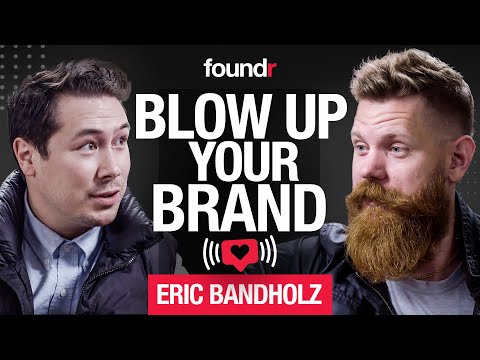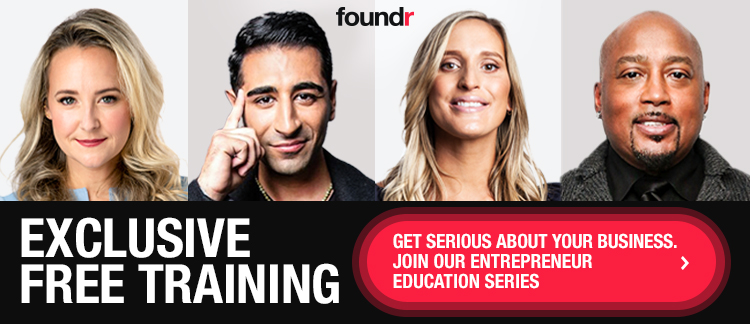Your personal brand and business are invariably connected—whether you like it or not. Nail your personal brand, and it’ll forever be a catalyst for your business (and future businesses). Get your personal branding wrong, and it’ll tank any venture before it even takes off.
Woah.
While that might be daunting to imagine, it’s a little bit more complex than that—and there’s a grey area in the middle, too.
Think about Oprah Winfrey. Thanks to her personal brand, people would buy just about anything she puts her name on—whether that’s lip gloss, bath salts, or a cookbook. On the other end of the spectrum, picture any product from Fyre Festival’s Billy McFarland. It doesn’t matter how good it is or how many professionals sign an endorsement. There’s no trusting it. Ever.
And then there’s the grey area in the middle of personal branding that comes off as vague, obscure, and labeless. For example, take political figure, Aaron Burr—it’s hard to know what he did, stood for, or impacted (besides shooting Alexander Hamilton).
Your goal is to build a personal brand that forever advances your business, and that only happens from building an Oprah-like image—not a McFarland or Burr resemblance.
That might sound easier said than done (because it is), but we’re here to help you get started. Below, we’ll cover everything you need to know to launch your personal brand and connect it to your business:
- What Is a Personal Brand?
- Benefits of Personal Branding
- How to Build the Right Kind of Personal Brand
- Connect Your Personal Brand to Your Business
- Actionable Tips for Building a Personal Brand
What Is a Personal Brand?
Your personal brand is you. If a business brand is a registered name, logo, tagline, mission statement, feature, product, and voice, then your personal brand is a collection of your:
- Name
- Image
- Personal branding statement
- Unique value proposition
- Offering (products/services)
- Personality
- Audience
It could go deeper to include personal logos, taglines, and the like (as with Gary Vaynerchuk), but it starts as simple as the elements above.
A personal brand is much more than tangible and visual characteristics. It’s the feelings, thoughts, and impressions associated with you.
When we said Gary Vaynerchuk’s name before, you probably thought of words like entrepreneur, outspoken, candid, and digital marketing. That’s his brand. When you think of Wendy’s, you likely think of Baconators, unusual square burgers, and a spicy Twitter account—that’s Wendy’s in a nutshell.
Tom Peters said it best in his Fast Company article decades ago: “We are CEOs of our own companies: Me Inc. To be in business today, our most important job is to be head marketer for the brand called You.”
When building your personal brand, your objective is to help your audience see you in the way you intend. And, unfortunately, that doesn’t just happen from being the best version of you. Building a personal brand that your target market recognizes and trusts requires intention—but we’ll get into that a bit more with our brand-building tips further down the page.
Benefits of Personal Branding
Like most entrepreneurs, you have a lot on your plate. Building a business, securing financing, juggling life responsibilities, and perhaps even holding down a full-time job—it’s a lot to handle. So, with all that going on, should personal branding really be a priority?
Yes, it should. And here’s why:
- Grow an Audience: Building your personal brand could help you gain exposure to new business ideas and products before they even launch. Imagine launching a business that has already hooked thousands of potential buyers—that’s the power of personal branding.
- Validate Your Business: Brand-new businesses that pop up out of nowhere take time to earn awareness and trust. When your personal brand is already credible and recognized, you get a jump-start to this validation.
- Build Your Career: If your business takes off, you want your name attached to it. Who founded Facebook? We don’t have to tell you. Who founded Pinterest? You probably need to Google it, right?
- Do More Good: 92% of consumers trust influencers more than advertisements or traditional celebrity endorsements. You can have more of an impact on your audience through your own voice than your business’s.
- Make More Money: Put 2 similar products side-by-side with a CEO you like behind one and a CEO you hate behind another. Who will you buy from? That’s how your personal brand impacts your business’s bottom line.
How to Build the Right Kind of Personal Brand
Not every personal brand is the same, so you’ll want to take time thinking about how you want to show up before you put a plan into action. An old article from The New York Times describes 6 different types of personal brands—and each will impact how you connect your personal brand with your business:
- Altruists: Altruists dedicate their time and public image to helping others. They want to make the world a better place, and they do this through service, philanthropy, and pro-bono work. Popular altruists include Bill Gates, Warren Buffett, Angelina Jolie, and Michael Bloomberg.
- Careerists: Careerists seek to become thought leaders in the industry by sharing personal and business achievements and news. You won’t find them talking much about their personal lives—it’s mostly business and innovation. Elon Musk, Sarah Blakely, Jeff Bezos, and Neil Patel fall into this category.
- Hipsters: Hipsters chase everything new and up-and-coming. They tend to show up as influencers with large followings and a desire to shout their ideas to the rooftops—and these will be the first to know about the latest trends and shiny objects. Hipster entrepreneurs include Sam Parr and our very own Nathan Chan.
- Boomerangs: Boomerangs like to influence the algorithms in their favor by sparking controversy. They don’t always agree with the ideas they present (and sometimes they don’t have an opinion at all), but they want to provoke conversation, debate, and emotions. Think of your favorite meme accounts, news reporters, or commentators.
- Connectors: Connectors thrive by building communities. You’ll find them posting on LinkedIn about job opportunities at a friend’s company and mentoring individuals in their free time. They tend to be active in feeds, comments, and groups. Meeting new people feeds Connectors’ energy.
- Selectives: Selective personal brands tend to share information with specific audiences—they are super niched. They don’t seek to become the most influential people on the planet. Instead, they are resourceful thought leaders in their given spheres of influence (regardless of how big or small they are).
Connect Your Personal Brand to Your Business
Think of what personal brand you want to build and how it’ll help your business. If you’re launching a freelance writing business, becoming a Boomerang likely won’t do your career much good. However, if you’re looking to become an objective reporter and cover the latest trending news, a Boomerang personal brand will suit you well.
Launching a brand-new ecommerce product? You’ll have more success with a Hipster or Careerist personal brand. Looking to raise money for a non-profit? Aim to become an altruist.
When your personal brand doesn’t align with your business, it either hurts your business’s reputation or does nothing at all—but it rarely does any good.
Fortunately, you’re in control of your personal brand. It’s not weird for CEOs or founders to sell their own products—it’s expected.
Just make sure you don’t end up like Cristiano Ronaldo when he started selling Facial Fitness Pao, a mouthpiece with propellers meant to strengthen your face. See, Ronaldo could sell jerseys, underwear, soccer bars, ab rollers, massage cream, or anything remotely related to fitness and physique. However, a strange facial strengthening device just doesn’t align with his brand—and everyone noticed (and not for the better).
4 Actionable Tips for Building a Personal Brand
Now, it’s time to start building your personal brand. This won’t just happen on its own. If you want to establish yourself as a thought leader, entrepreneur, or influencer, you have to take action. Below, we’ll cover a few personal branding tips to help you establish a brand that benefits you and your business:
1. Pinpoint Who You Want to Be
First, start with who you want to be. Forget about your high school, cliques, and college degree and define who you want to become—not who you are.
This is a good time to figure out your goal for personal branding. Why are you reading this article? What’s making you want to invest the time and effort into building a specific personal brand?
There’s no wrong or right answer, but these responses will give you insights into your motivations and help you answer the following questions.
“I think you look at yourself and what you like to do,” says Eric Bandholz. “Are you more of an audio person? Then maybe podcasting’s the way to go. Are you more of a writer, you know, introvert? Do you like to express yourself through words? Then blogging is a great way to go. Then, of course, if you’re narcissistic like me…then video is a great source for you.”
Now’s also an excellent time to identify your branding role models. Which personal brands do you admire and want to replicate? While you’ll be building your own unique personal brand, following the successes and avoiding the failures of those who came before you will help accelerate your success.
2. Find Your Unique Value Proposition
Your unique value proposition (UVP) is a statement that explains what unique offering you bring to the table. Why should someone buy your products? Why should they follow you on LinkedIn instead of someone else? What makes you different?
You might be better able to relate to entrepreneur mothers who are balancing building a business while raising kids. Or you might have a unique insight and perspective after living in Africa for 3 years.
Think of what makes you special—and think of how you can provide value with that peculiarity. Coming up with a UVP is hard, so don’t get discouraged if it doesn’t come to you quickly. If you need a hand, give the article below a quick read.
Read more: How to Write Your Unique Value Proposition (Tips + Examples)
3. Define Your Target Market
You can’t be everything to everyone—nor should you try. “A friend to all is a friend to none,” said Aristotle (and Taylor Swift). Instead, identify your niche.
Your niche might be zombie fanatics, or it could be country music lovers. It might be social media managers, or it could be aspiring ultramarathon runners.
However, it’s hard to be a thought leader to all of these groups.
Think about your UVP and who it’d best serve. This will help you start narrowing down your target market.
Read more: The Guide to Defining Your Target Market
4. Create a Personal Branding Statement
Now, it’s time to tie tips #1-3 together into an official personal branding statement. Your personal branding statement is a short-and-sweet message (1 or 2 sentences) that sums up who you are, what you uniquely do, and who you serve.
For example, Gary Vaynerchuck’s is: “Gary is an entrepreneur at heart—he builds businesses. Today, he helps Fortune 1000 brands leverage consumer attention through his full-service advertising agency, VaynerMedia.”
Mari Smith’s is: “I help businesses and brands to get high integrity, profitable exposure online. My methodology demystifies social media marketing, and emphasizes how relationship building is always at the heart of successful business.”
Grow Your Personal Brand with the Right Know-How
There’s no “best” channel to grow your career. Depending on your personality, industry, and aspirations, that might be on TikTok, Instagram, YouTube, Facebook, or even a personal blog. Regardless, the better you know your platform and the strategies for success, the better you’ll be able to build your personal brand.
Our library of free courses has everything you need to help skyrocket your brand. Whether you need to learn how to grow your Instagram following, run profitable Facebook Ads, or write compelling copy, we’ve got you covered.
Check out the library of courses today to learn the next skill you need to grow your personal brand.
The post How to Build a Personal Brand to Skyrocket Your Business appeared first on Foundr.




